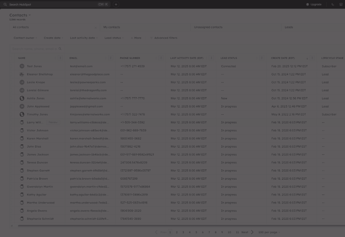Today’s world is growing in complexity and touch-points with regard to when and where a customer might interact with your business. With all these new channels to manage, it’s likely you will run into some duplication of efforts. You are probably familiar with ecommerce as it is the foundation of your digital selling. Customer relationship management (CRM), however, is often treated as a separate marketing effort distinct from sales.
But there are now solutions coming online that merge ecommerce with CRM to allow you to reap the benefits of both simultaneously. This is referred to as CRM-powered ecommerce or ecommerce CRM.
What is CRM-powered eCommerce?
An ecommerce CRM combines the functional online shopping experience with a full-fledged customer relationship management module that helps you understand sales analytics and leverage customer data for better overall relationship management.
How can eCommerce integrate with a CRM to benefit your business?
If the two different strategies are often managed separately, then you might be wondering why integration is necessary at all. For one, while you might be using applications like PayPal or Venmo to fulfill certain payments, they often lack the insight that can be generated from a dedicated customer relationship management system.
Moreover, maintaining separate sales and CRM systems can create disconnects between front- and back-office operations. Without a synchronized process between the two, you’re often losing a ton of insight-rich data during handoffs between the two divisions.
For this reason, an integrated ecommerce functionality within your native CRM can better serve your internal and external stakeholders by breaking down the barriers to purchasing and allowing you a much better overview of customer experiences throughout the buying process.
What are the features of CRM-powered eCommerce?
CRM Payment Processing
CRM payment processing essentially combines what was initially strictly a CRM tool with a seamless payment system that reduces the lead time needed for physical check verification.
CRM payment processing collects all the information related to your customers and their overall buying behavior. It essentially becomes a one-stop shop for both you and your customers to interact with the company and manage transactions.
CRM Auto-Payments
The integration of CRM and ecommerce capabilities gives rise to another interesting feature capability: automatic payments. With access to customer information and online transaction capabilities, a combined ecommerce CRM can execute regular recurring payments, or auto-payments, based on specific buyer needs.
And instead of having to file and manage post-dated checks, CRM auto-payments can provide faster and more accurate real-time tracking of payments made based on regular interval purchases.
Tracking purchase journeys
As you combine the information found in your CRM, it creates a shared space, allowing different internal stakeholders to easily learn about key behavioral aspects about your customers and relate them directly to their purchases.
Tracking purchase journeys gives you better insight into how your customers interact with your company before, during, and after they make a purchase. This data can prove invaluable to those working in the field, managing business analytics, and even executing internal audits on specific transactions.
Payment and transactional data recording
Payment data is sensitive information, and the normal procedures surrounding keeping confidentiality are often complex and difficult to manage. CRM ecommerce systems, however, can associate payment and transactional data with respective customers without sacrificing security and with little to no extra effort.
In addition, being a largely virtually managed system, an e-commerce CRM system can save you time and resources that you might currently be spending running a manual system by executing all the data recording automatically.
Benefits of CRM-powered eCommerce
Align all departments and centralize operations
One of the biggest pain points for any growing company is the divide that often occurs between business units tasked with different functional areas. As organizations mature, different groups begin developing diverging thoughts on different aspects of the business, especially regarding how to generate revenue.
A CRM-powered e-commerce platform can help tear down the barriers between departments by essentially being a one-stop shop for your internal teams to begin collaborating on new insights. Moreover, this can make executing specific CRM and e-commerce tasks much easier through cross-team collaboration.
Enable touchless selling for B2B and B2C
B2C has always been at the forefront of innovation in providing advanced eCommerce capabilities to businesses. Unfortunately, for B2B, the same innovations have not yet been fully realized in every industry. In fact, almost 77 percent of B2B eCommerce buyers expressed frustration with how their latest purchase was managed.
For this reason, combining CRM and eCommerce functionalities can bring about those efficiencies for B2C and B2B operations and introduce touchless selling capabilities through interactions with specific customers. This can help fine-tune your organization’s overall engagement approach and even create efficiencies through sales with very few actual salespeople involved.
Streamline rep-assisted sales
CRM eCommerce functionality helps make sales representatives' lives much easier through a more efficient transaction process. These processes are streamlined and integrated within the very systems your sales representatives use, which allows them to focus more on building relationships instead of managing administrative duties related to the actual transaction.
CRM-powered eCommerce also has the potential to create automated workflows and triggers that help simplify processes your representatives may currently execute manually. That means they can spend less time worrying about order specifics and more time developing their customer relationships and working toward landing other potential business.
Deliver customer-centric experiences and digital services
CRM-powered eCommerce systems have the capability to deliver a customer-centric experience that reduces the barriers to purchasing while simultaneously enriching their buyer's journey. Various virtual and digital services can be integrated into automated workflows, and at the same time, the system can collect potential data points for further analysis down the line.
Your customers will worry less about getting in touch with you or navigating your unique transaction system through a much more unified and intuitive customer journey with your business. This means a better customer experience, fewer administrative errors, and more opportunities for customer development through different channels.
What CRMs with built-in payments are available?
HubSpot
Hubspot Payments is the simplest, easiest, and most secure platform for B2B businesses to manage CRM and online transactions in one space. To use their features, HubSpot charges a rate based on the transaction amount, which differs between debit/credit card usages (2.9%) and ACH payments (0.5%, capped at $10).
One great feature of HubSpot Payments is the ability to include either a one-time or a recurring payment link, depending on the contract transaction. This makes the time between interactions, quotes, and actual transactions much quicker and more seamless for all parties involved.
Alongside the included functionalities of automated workflows, HubSpot Payments has the potential for a much better overall customer experience and better internal productivity regarding sales management. To learn more, download our Essential Guide to HubSpot Payments.
Keap
Keap is a platform better suited for small businesses that need a simple eCommerce, invoicing, and payment processing system for their online presence. Their prices start off for free (on a limited trial basis), then move to a paid subscription (either monthly or annually) whose cost depends on the number of customer contacts and internal users.
Keap is an example of a streamlined CRM-powered eCommerce platform that allows customers to pay directly from the invoice quote. Recurring payments are also available, which you can set up from the attached CRM space and modify based on dates, frequency, and more. Keap also has B2C capabilities in managing fairly fast-moving goods and high inventory counts.
Zoho
Zoho is a platform with a specific function and focuses on tax compliance across international businesses. This can be an incredible sticking point for companies that are just beginning to expand overseas, giving Zoho a competitive edge in this space. The platform has a free plan but can go as high as $249 (billed monthly) for organizational use. However, even this can be modified through customer enterprise deals based on the company and its situation.
Zoho is a cloud-based, CRM-powered eCommerce platform that allows you to use the same transaction services while being confident that the transaction itself is tax compliant, wherever it might occur.
Accelo
Accelo is a multifunctional CRM-eCommerce platform that also has integrated project management systems. This allows for better planning out of projects alongside its main online sales and customer relations systems. Currently, Accelo is on a limited free trial basis, with monthly and annual subscriptions available for interested parties.
Accelo is good for companies looking to integrate more than just their CRM and eCommerce platforms and want to include planning processes and workflow management as well.
Key Takeaways
CRM-powered eCommerce is the next step for B2B systems as it helps businesses better facilitate the following:
- CRM payment processing
- CRM automatic payments
- Tracking purchase journeys
- Recording payment and transactional data
This combination of platforms provides many different benefits, ranging from better alignment and smoother processes for internal and external stakeholders to creating better efficiencies in terms of sales and how your customers experience your business from start to finish.
While many different platforms are available, HubSpot Payments remains one of the most flexible options due to its transaction cost model that saves you from recurring monthly payments.
For a deeper dive into maximizing your sales potential and identifying common pitfalls, download our guide, '4 Reasons Your Website Isn't Generating Sales', and discover actionable insights to enhance your ecommerce strategy.



